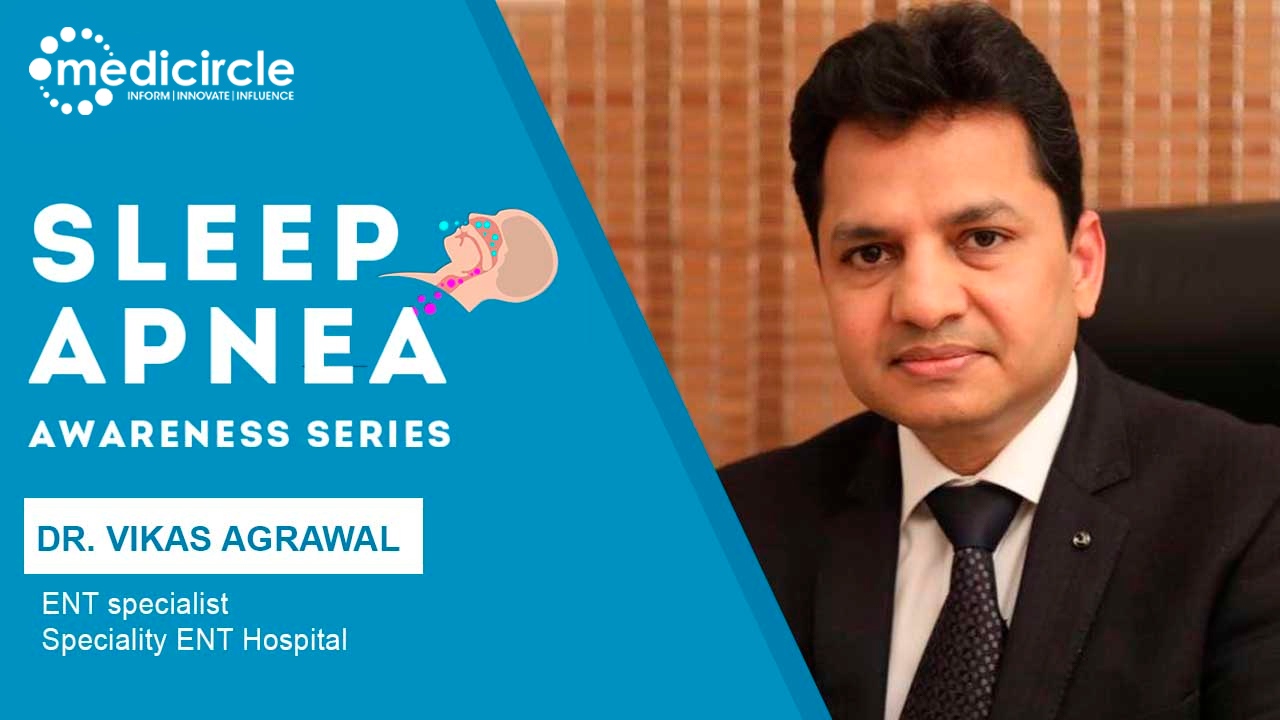Dr. Vikas Agarwal holds experience of more than 20 years and has conducted around 6000 surgeries. He is the President of the Indian Association of Surgeons for Sleep apnea (IASSA).
Obstructive sleep apnea
Dr. Vikas begins, "Obstructive sleep apnea is a very common condition. 4-5 % of the population has symptomatic sleep apnea and 8-9% of the population has actual obstructive sleep apnea. People are not aware of this condition while snoring happens in every home.”
Difference between snoring and obstructive sleep apnea
Dr. Vikas explains, “Snoring is the disturbed breathing during sleeping whereas obstructive sleep apnea is when your breathing is repeatedly interrupted during sleep. This disturbs your natural sleep rhythm and the patient spends more time in light sleep and less in deep sleep. Deep restorative sleep is necessary to keep you energetic and productive the next day. If not treated on time, sleep apnea may result in stroke, heart disease.”
Causes of obstructive sleep apnea
Dr. Vikas expresses, “The most common cause of obstructive sleep apnea is obesity or being overweight. Obese people require more oxygen to breathe. With an increase in weight, the requirement for oxygen also increases, and a narrowed neck can cause the airway to get blocked.
Otherwise, also many people snore during sleep whose weight is under check. It is more common in 45-50 years old men. If someone has problems with the nose, sinus, tonsils, larger tongue, in such a situation also people snore. So, it is the combination of anatomy and physiology.”
Symptoms of obstructive sleep apnea
Dr. Vikas talks about the symptoms of sleep apnea
1. Snoring
2. Sleep disturbance, the patient feels daytime sleepiness and fatigue no matter how much time he spends in bed
3. Feeling irritated all the time
Diagnosis of obstructive sleep apnea
Dr. Vikas advises, “In order to find out if you have sleep apnea, you need to perform a sleep study test. You can do this at your home also. It is the gold standard for diagnosing sleep apnea. If the result confirms, then you can consult the doctor."
Treatment of obstructive sleep apnea
Dr. Vikas adds, “Obstructive sleep apnea can be treated by using a CPAP mask that delivers a steady stream of air while the patient sleeps. This is used for patients who are very old (beyond 80) with extreme obesity (weight is 90 and above). Surgery carries risks of complications and infections for these groups.
The second option is surgery. Surgery is performed to increase the size of the airway. Especially those who have problems with anatomy can get their surgery done. Surgery is best for patients who are not very old (not beyond 55) and not very obese (not more than 80 kilos). Surgeries are very effective in these patients which can make their life easier and help them lead a quality life. Patients can be surgically or medically treated. The surgeon may remove tonsils, reconstruct the nose, reconstruct the jaw to enlarge the upper airway.”
Dr. Vikas stresses, “With newer technologies like Transoral robotic surgery and Plasma ablation, treatment has become much easier and more effective. The advantages of these technologies are – no blood loss and painless techniques.
Hypoglossal nerve stimulation – It is also known as the 'pacemaker of the tongue'. The treatment works by stimulating the hypoglossal nerve to restore the tone to (or stiffen) the key tongue muscles. It has not yet started in India. It is being practiced abroad. It is quite an expensive treatment.”
How affordable is sleep apnea treatment?
Dr. Vikas mentions, “Surgeries for sleep apnea are affordable in India and are also covered under Mediclaim. However, CPAP is not covered under Mediclaim. Sleep apnea surgery is way more affordable when compared to heart surgeries.
Sleep apnea is the main cause of heart attack and sudden deaths in the present scenario. Sleep apnea is a life-threatening disease and the most common cause of heart disease. All these years, researchers and people were unaware of this fact but now they are trying to figure out more about this.”
Lifestyle changes for sleep apnea
Dr. Vikas listed some lifestyle changes for sleep apnea
1. Try to avoid junk food
2. Eat a well-balanced diet
3. Sleep and wake up on time, take 8-9 hours of sound sleep.
4. Maintain your sleep hygiene
5. Maintain the right balance between work and life.
Dr. Vikas concludes, “Those people who are having disturbed sleep or feeling irritated throughout the day, should take a sleep study test. If the result comes negative, they can check for Upper Airway Resistance Syndrome.
Upper Airway Resistance Syndrome (UARS) is an increase in resistance to airflow within the upper airway. This is common in young people weighing normal. Obstructive Sleep Apnea (OSA) is common in obese people.”
(Edited by Renu Gupta)

 Obstructive sleep apnea is a life-threatening disease and is the most common cause of heart diseases like heart attack and stroke if left untreated. Obesity is the most common cause of this. Let's get more information on this common condition from expert doctor Dr. Vikas Agarwal.
Obstructive sleep apnea is a life-threatening disease and is the most common cause of heart diseases like heart attack and stroke if left untreated. Obesity is the most common cause of this. Let's get more information on this common condition from expert doctor Dr. Vikas Agarwal.





.jpeg)
.jpeg)

_(1).jpeg)
.jpeg)
_(1)_(1)_(1).jpeg)
.jpeg)


.jpeg)





.jpeg)

.jpeg)

.jpeg)
.jpeg)
.jpeg)




